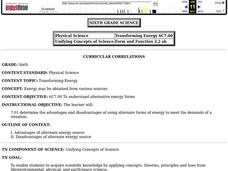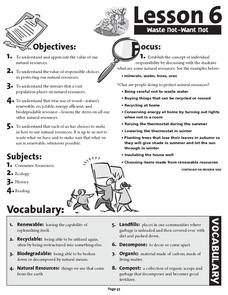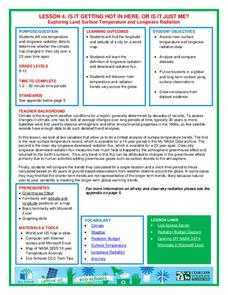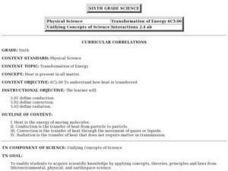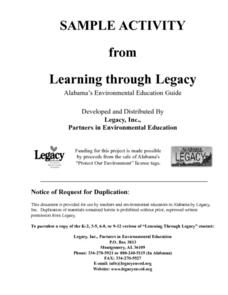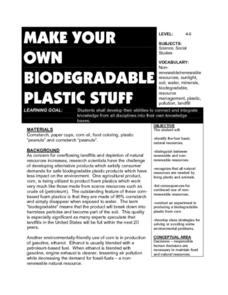Please login to access this page.
Curated OER
Class Presentation on Coal
Did you know that coal was formed from plants? After being assigned a coal-related topic, groups gather, organize, and present information about this energy source. The presentations should include visuals like graphs, charts, tables,...
Curated OER
Transforming Energy
Sixth graders study about alternate energy sources and discuss with their neighbor how alternative energy sources affect environmental conditions so that an entire species could be affected.
Curated OER
Energy Audit
Students examine the level of energy usage on a local and national level. Using the internet, they discover ways to conserve energy every day and how over-consumption of energy negatively affects the environment. In groups, they...
Curated OER
The Energy Debate - Conclusion
Students write a persuasive essay about the choices in the energy debate. They comprehend the environmental consequences that accompany the decision. Students predict how they will power their future.
National Wildlife Federation
Ghost Town
Around 93 percent of the reefs on Australia's Great Barrier Reef have been bleached, and almost one quarter of them are now dead. Scholars research the sea temperatures, especially around the areas with coral reefs, to make connections...
Curated OER
Regents High School Examination: Living Environment 2009
Emerging ecologists need a full understanding of life, from the inner workings of a cell to the complex relationships among organisms. This examination is meant to assess high schoolers after an entire year course on the living...
National Wildlife Federation
Get Your Techno On
Desert regions are hotter for multiple reasons; the lack of vegetation causes the sun's heat to go straight into the surface and the lack of moisture means none of the heat is being transferred into evaporation. This concept, and other...
Forest Foundation
Waste Not - Want Not
Recycling is the focus in the sixth of a nine-lesson series devoted to forest ecosystems. Class members read an article about the responsible use of natural resources and ways to reduce land fill.
Science 4 Inquiry
Enzymes in Action
Enzymes play a role in almost every function in the human body. Scholars explore three variables related to the use of enzymes. They observe a catalase reaction, experiment with substrates, and examine reactions rates.
National Wildlife Federation
I Speak for the Polar Bears!
Climate change and weather extremes impact every species, but this lesson focuses on how these changes effect polar bears. After learning about the animal, scholars create maps of snow-ice coverage and examine the yearly variability and...
National Wildlife Federation
Is It Getting Hot in Here, or Is It Just Me?
Currently, only 2.1% of global warming is felt on continents, while over 93% is felt in the oceans. The fourth lesson in the series of 21 on global warming is composed of three activities that build off one another. In the first...
Curated OER
Transformation of Energy: Heat
Sixth graders investigate how heat is transferred and the concepts of conduction, convection, and radiation. They define key vocabulary terms, and observe teacher-led demonstrations of conduction, convection, and radiation.
Curated OER
Gotta Have Energy
Students explore energy. They discuss the types and uses of energy and research an assigned energy source. They create a "benefits versus potential environmental impacts" chart that lists energy sources and possible impacts. They...
Curated OER
Sunlight Necklaces
Third graders review the placement and role of the sun in the solar system. Using beads, they create a necklace which they can use to identify the amount of sunlight is being illuminated. In groups, they record observations on the...
Curated OER
Fossil Fuels (Part II), The Geology of Oil: Topographic Mapping, Crustal Deformation, Rock Porosity, and Environmental Pollution
Students review an interpretation of geologic history and relate it to the formation of oil deposits. They explore and explain factors controlling the porosity and permeability of sediments and sedimentary rocks. Pupils also interpret...
Curated OER
Chocolate Chip Cookie Mining
To understand the impact coal mining has on the environment, pupils will extract chocolate chips from a cookie. Imagine the cookie is the environment and the chips are the coal. Instruct them to mine as many chips as they can, then have...
Curated OER
Make Your Own Biodegradable Plastic Stuff
Students identify the four basic natural resources. They distinguish bettween renewable and non-renewable resources. Pupils recognize that all natural resources are needed by living plants and animals. Students list consequences for...
Chicago Botanic Garden
Faces of Climate Change
Sometimes, the best solution to a problem can be found by walking in someone else's shoes. Here, scholars use character cards to take on the roles of people around the world. They determine how their character's...
Teach Engineering
Cellular Respiration and Bioremediation
You can breathe easily now that you've found a winning resource. Young biologists learn about the process of cellular respiration, primarily through teacher-led discussion and instruction. They also consider the concept of...
Curated OER
Sustainable Marine Fisheries
Through a fishing simulation, environmentalists discover consequences of over fishing. Afterward, they discuss how the activity relates to the impact of real-life commercial fishing. They also consider sustainability in the fishing...
Habitat Conservation Trust Foundation
Greenhouse Gas Game
You will need to gather a number of tokens, bags, and other various game components in order to incorporate this activity into your curriculum. Different tokens represent carbon dioxide, methane, and nitrous oxide. Printable 8.5"x11"...
Curated OER
Hazards: Kindergarten Lesson Plans and Activities
The last unit in the series allows kindergarteners to see the dangers and hazards associated with each of the natural disasters learned so far in the series—earthquakes and volcanoes. They listen to sounds associated with the...
Curated OER
Chemical Consequences of Burning Fossil Fuels
Future scientists are introduced to the chemical consequences of burning fossil fuels, learning that fossil fuel combustion leads to the formation of oxides of three nonmetals: carbon, nitrogen, and sulfur, all of which end up in the...
Curated OER
Climate Chaos Week
Pupils research the pros and cons of wind farm technology as an alternative source of energy. The class is divided into two groups that should formulate a debate on each side of the argument. Groups use a debate guide to help develop...

